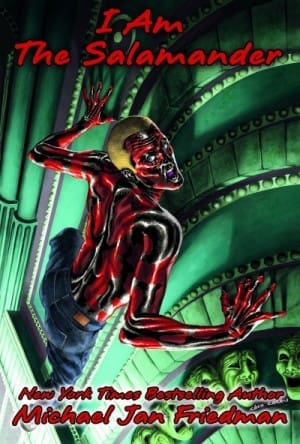I’ve written 72 of them, y’know. And that’s not counting comic books, TV scripts, etc. And you’re asking me to name my favorite?
Hmm…I’ve naturally got to consider my most recent novels, all of which bear the noble Crazy 8 Press insignia. After all, these are my purest visions, the tales closest to my heart.
For instance, Fight The Gods, the roller-coaster-ride of a New York City cop who finds out he’s not what he seems. At all. One reader described this novel as “Percy Jackson for adults.” Not a bad tag line, that.
And then there are the Aztlan stories, noir murder mysteries set in an alternate-reality, 21st-century Aztec Empire. As I often tell readers of these novellas, you’re gonna love Maxtla Colhua, Imperial Investigator. I do. (Then again, I invented him…)
Of course, no list of my favorite “kids” would be complete without I Am The Salamander, set to be released this fall, in which young cancer survivor Tim Cruz endures a metamorphosis even Kafka never dreamed of. You think it’d be nifty to have super-powers? Think again.
The Hammer and the Horn–a swords-and-sorcery adventure steeped in Norse mythology–would have to be up there too. It was, after all, the first book I ever sold, way back in the 1980s. And it paved the way for The Seekers and The Sword and The Fortress and The Fire, the rest of the Vidar Saga trilogy, all of which is being re-released here at Crazy 8 Press.
 But my favorite? That might be Starfleet: Year One. And I’ll tell you why.
But my favorite? That might be Starfleet: Year One. And I’ll tell you why.
About fifteen years ago, then-Star Trek editor John Ordover asked me to write a serial that would appear in the back of every Trek novel for twelve consecutive months. I’d long been intrigued by an unexplored territory: the beginnings of Starfleet, 200 years before Captain Kirk, and the captains that would have been the first to boldly go.
I based my serial loosely on The Right Stuff, except the dividing line that ran through the first crop of Starfleet captains was whether they were a) pilots forged in the furnace of the Romulan War or b) scientists–”butterfly catchers” I called them. As we Trek historians know, Starfleet ended up drawing on the perspectives of both camps. But which of these captains-in-conflict would end up commanding the new, state-of-the-art Daedalus–the prize in their philosophical struggle?
I loved writing this story. I loved the characters. I loved the way it dovetailed with Trek continuity. I loved the way it advanced the greater epic. This, I thought at the time, was my best work.
Anyway, the serial was well-received. The plan, after a while, was to add a little more material and turn it into a freestanding novel called Starfleet: Year One, which would soon be followed by Years Two, Three, Four, Five, Six, and Seven. I was stoked.
Until I found myself sitting next to Rick Berman’s sister at a party. Her name was Judy, and she was a lovely woman whom I had met before. Rick, her brother, was Gene Roddenberry’s successor as honcho of the Trek franchise at Paramount. “Judy,” I said, “you’ve got to tell me about this fifth series that’s coming out. You know I won’t tell anyone.” Judy looked around to make sure no one was eavesdropping and said beneath her breath, “Think two hundred years before Kirk.”
Which was pretty much what Starfleet: Year One was about.
In the days that followed, Paramount almost put the kibosh on the Starfleet: Year One book. The compromise we obtained was that it would come out, but there would be no Year Two, etc. And Year One would bear a disclaimer that it had nothing to do with the events depicted in Star Trek: Enterprise.
So all those captains I invented, painstakingly modeling their origins and personalities, carefully intertwining them with established Trek history? You’ll only see them in Starfleet: Year One.
On the other hand, as we know all too well, nothing in science fiction is defunct forever…

